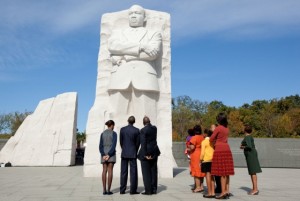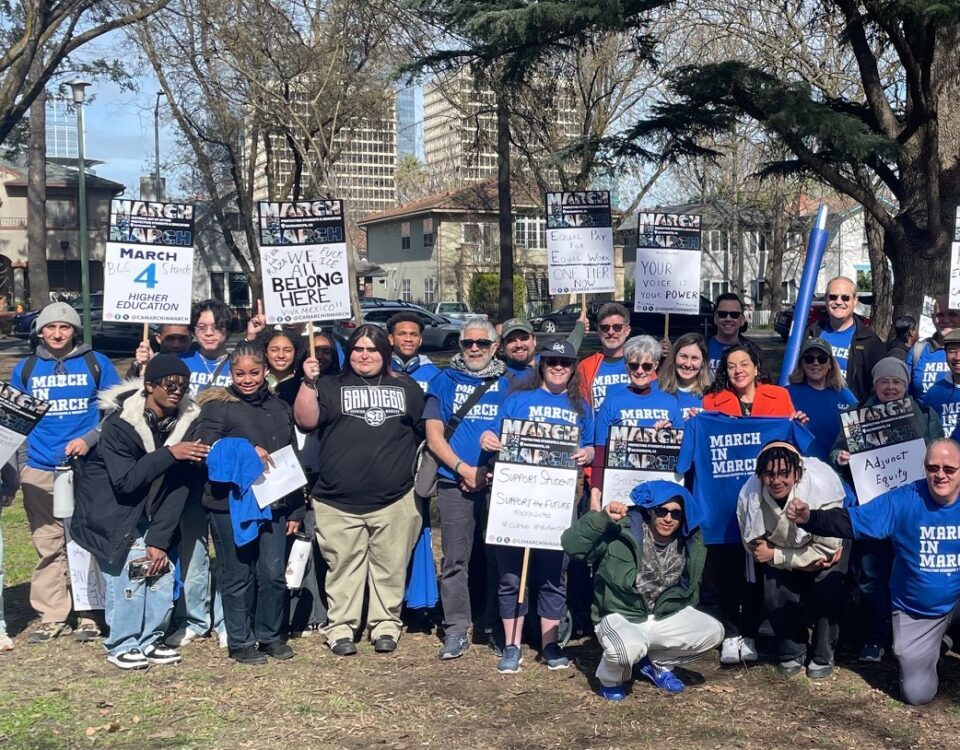
Photo: Chuck Kennedy/White House -- President Obama and the First Family viewed the MLK National Memorial before the official dedication in Washington DC October 16, 2011
The Martin Luther King, Jr. National Memorial has been open since last August, but the official dedication was delayed until today by the fury of Hurricane Irene during the summer. A crowd estimated to be around 30,000 gathered on the National Mall to witness the historic event.
Remarks by President Obama at the Martin Luther King, Jr. Memorial Dedication
The National Mall
Washington, D.C.
For this day, we celebrate Dr. Martin Luther King, Jr.’s return to the National Mall. In this place, he will stand for all time, among monuments to those who fathered this nation and those who defended it; a black preacher with no official rank or title who somehow gave voice to our deepest dreams and our most lasting ideals, a man who stirred our conscience and thereby helped make our union more perfect.
And Dr. King would be the first to remind us that this memorial is not for him alone. The movement of which he was a part depended on an entire generation of leaders. Many are here today, and for their service and their sacrifice, we owe them our everlasting gratitude. This is a monument to your collective achievement. (Applause.)
Some giants of the civil rights movement –- like Rosa Parks and Dorothy Height, Benjamin Hooks, Reverend Fred Shuttlesworth –- they’ve been taken from us these past few years. This monument attests to their strength and their courage, and while we miss them dearly, we know they rest in a better place.
And finally, there are the multitudes of men and women whose names never appear in the history books –- those who marched and those who sang, those who sat in and those who stood firm, those who organized and those who mobilized –- all those men and women who through countless acts of quiet heroism helped bring about changes few thought were even possible. “By the thousands,” said Dr. King, “faceless, anonymous, relentless young people, black and white…have taken our whole nation back to those great wells of democracy which were dug deep by the founding fathers in the formulation of the Constitution and the Declaration of Independence.” To those men and women, to those foot soldiers for justice, know that this monument is yours, as well.
Nearly half a century has passed since that historic March on Washington, a day when thousands upon thousands gathered for jobs and for freedom. That is what our schoolchildren remember best when they think of Dr. King -– his booming voice across this Mall, calling on America to make freedom a reality for all of God’s children, prophesying of a day when the jangling discord of our nation would be transformed into a beautiful symphony of brotherhood.
It is right that we honor that march, that we lift up Dr. King’s “I Have a Dream” speech –- for without that shining moment, without Dr. King’s glorious words, we might not have had the courage to come as far as we have. Because of that hopeful vision, because of Dr. King’s moral imagination, barricades began to fall and bigotry began to fade. New doors of opportunity swung open for an entire generation. Yes, laws changed, but hearts and minds changed, as well.
Look at the faces here around you, and you see an America that is more fair and more free and more just than the one Dr. King addressed that day. We are right to savor that slow but certain progress -– progress that’s expressed itself in a million ways, large and small, across this nation every single day, as people of all colors and creeds live together, and work together, and fight alongside one another, and learn together, and build together, and love one another.
So it is right for us to celebrate today Dr. King’s dream and his vision of unity. And yet it is also important on this day to remind ourselves that such progress did not come easily; that Dr. King’s faith was hard-won; that it sprung out of a harsh reality and some bitter disappointments.
It is right for us to celebrate Dr. King’s marvelous oratory, but it is worth remembering that progress did not come from words alone. Progress was hard. Progress was purchased through enduring the smack of billy clubs and the blast of fire hoses. It was bought with days in jail cells and nights of bomb threats. For every victory during the height of the civil rights movement, there were setbacks and there were defeats.
We forget now, but during his life, Dr. King wasn’t always considered a unifying figure. Even after rising to prominence, even after winning the Nobel Peace Prize, Dr. King was vilified by many, denounced as a rabble rouser and an agitator, a communist and a radical. He was even attacked by his own people, by those who felt he was going too fast or those who felt he was going too slow; by those who felt he shouldn’t meddle in issues like the Vietnam War or the rights of union workers. We know from his own testimony the doubts and the pain this caused him, and that the controversy that would swirl around his actions would last until the fateful day he died.
I raise all this because nearly 50 years after the March on Washington, our work, Dr. King’s work, is not yet complete. We gather here at a moment of great challenge and great change. In the first decade of this new century, we have been tested by war and by tragedy; by an economic crisis and its aftermath that has left millions out of work, and poverty on the rise, and millions more just struggling to get by. Indeed, even before this crisis struck, we had endured a decade of rising inequality and stagnant wages. In too many troubled neighborhoods across the country, the conditions of our poorest citizens appear little changed from what existed 50 years ago -– neighborhoods with underfunded schools and broken-down slums, inadequate health care, constant violence, neighborhoods in which too many young people grow up with little hope and few prospects for the future.
Our work is not done. And so on this day, in which we celebrate a man and a movement that did so much for this country, let us draw strength from those earlier struggles. First and foremost, let us remember that change has never been quick. Change has never been simple, or without controversy. Change depends on persistence. Change requires determination. It took a full decade before the moral guidance of Brown v. Board of Education was translated into the enforcement measures of the Civil Rights Act and the Voting Rights Act, but those 10 long years did not lead Dr. King to give up. He kept on pushing, he kept on speaking, he kept on marching until change finally came. (Applause.)
Read the full text of the president’s remarks on the whitehouse.gov website. More photos and video of the president’s speech here on the White House blog .


